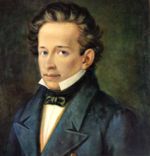No subscription or hidden extras
Read through all quotes from Giacomo Leopardi
In the first strophe in fact the Giacomo Leopardiep-herder even while defining the moon as silent actually expects a response from it and discovers many analogies between his own condition and that of the moon: both of them arise in the morning follow their always self-identical paths and finally stop to rest. Nerina and Silvia are both dreams evanescent phantasms; life for Leopardi is an illusion the only reality being death. He has come to the realization too late to change things that everything was done in vain that everything has been pointless that he will even die dishonoured and disgraced for his well-intentioned actions.
Giacomo Taldegardo Francesco di Sales Saverio Pietro Leopardi (Italian: [ˈdʒakomo leoˈpardi]; June 29 1798 – June 14 1837) was an Italian poet essayist philosopher and philologist. Although he lived in a secluded town in the ultra-conservative Papal States he came in touch with the main thoughts of the Enlightenment and by his own literary evolution created a remarkable and renowned poetic work related to the Romantic era.

